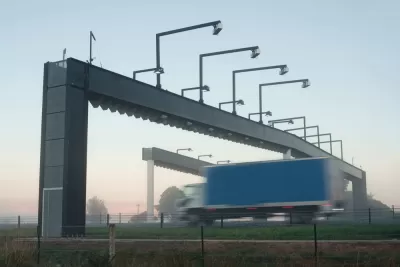It wasn't supposed to go this way. When Indiana leased the state's namesake, but failing, 157-mile toll road for $3.8 billion to an Australian-Spanish consortium in 2006 for 75 years, analysts predicted a handsome return for investors.

Jon Hilkevitch, transportation reporter and "Getting Around" columnist for the Chicago Tribune, chalks the possible bankruptcy of the Indiana Toll Road up to reduced driving in the United States, a topic much discussed in Planetizen.
(T)ransportation sources said the toll road concessionaire miscalculated regional and national driving trends when it bid the lease contract on the 58-year-old highway.
Vehicle miles traveled in the U.S. hit a peak at 3 trillion miles in 2007, according to the Federal Highway Administration. It then began its largest decline since the 1940s, hastened by the Great Recession of 2008.
There was speculation that ITR Concession Co. LLC, created by a partnership of Spain's Cintra and Australia's Macquarie Group Ltd., would sell its lease to "to get out from under $6 billion in debt," wrote Joseph S. Pete, business reporter for The Times of Northwest Indiana (NWI) on Sept. 15. However, Hilkevitch writes on Sept. 20 that ITR "said over the weekend that its strategy involves either selling its assets or recapitalizing the company by cutting debt, without a sale."
A Sept. 21 AP article indicates that ITR will declare bankruptcy on Monday, Sept. 22 and create a new entity to operate the toll road.
Should ITR sell the lease in the future, "the state will suffer no harm," writes Pete's colleague at NWI, Dan Carden.
In any case, the Indiana Toll Road was not alone in its financial predicament, notes Pete.
Before the toll road was leased in 2006, "tolls had not changed since 1985," wrote former Indiana Gov. Mitch Daniels in a 2006 New York Times op-ed (posted here). While the lease provided for annual toll increases, "finance professor Jonathan R. Peters at the City University of New York, an expert on toll roads, and other specialists who study toll road deals, cautioned that the lease in Indiana was structured so that tolls would remain relatively stable for the first decade, then could rise quickly for the remainder of the lease," as noted in 2008.
A Huffington Post 2009 op-ed, posted here, opined that privatizing public toll roads was not in the public's interest. If the Indiana Toll Road is to be viewed as an example, the real risk lies with the private sector as Indiana appears to have come out $3.6 billion ahead in their lease.
FULL STORY: Chicago Tribune: Indiana Toll Road operators to submit restructuring plan

Planetizen Federal Action Tracker
A weekly monitor of how Trump’s orders and actions are impacting planners and planning in America.

Maui's Vacation Rental Debate Turns Ugly
Verbal attacks, misinformation campaigns and fistfights plague a high-stakes debate to convert thousands of vacation rentals into long-term housing.

San Francisco Suspends Traffic Calming Amidst Record Deaths
Citing “a challenging fiscal landscape,” the city will cease the program on the heels of 42 traffic deaths, including 24 pedestrians.

Amtrak Rolls Out New Orleans to Alabama “Mardi Gras” Train
The new service will operate morning and evening departures between Mobile and New Orleans.

The Subversive Car-Free Guide to Trump's Great American Road Trip
Car-free ways to access Chicagoland’s best tourist attractions.

San Antonio and Austin are Fusing Into one Massive Megaregion
The region spanning the two central Texas cities is growing fast, posing challenges for local infrastructure and water supplies.
Urban Design for Planners 1: Software Tools
This six-course series explores essential urban design concepts using open source software and equips planners with the tools they need to participate fully in the urban design process.
Planning for Universal Design
Learn the tools for implementing Universal Design in planning regulations.
Heyer Gruel & Associates PA
JM Goldson LLC
Custer County Colorado
City of Camden Redevelopment Agency
City of Astoria
Transportation Research & Education Center (TREC) at Portland State University
Jefferson Parish Government
Camden Redevelopment Agency
City of Claremont


























